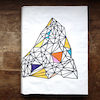Penser la narrativité contemporaine : La Carte et le territoire, formidable autoportrait de l’écrivain Michel Houellebecq
DOI:
https://doi.org/10.18352/relief.989Keywords:
métadiscours, éclectisme, hybridité, la vocation artistique, le retour à la narration, metadiscourse, eclecticism, hybridity, artistic vocation, the return of the narrativeAbstract
Les romans de Houellebecq sont un vaste corpus où s’affrontent différentes tendances artistiques qui peuvent lutter les unes contre les autres dans une même œuvre. L’auteur a figuré deux artistes dans La Carte et le territoire, roman qui contient par conséquent un grand nombre de métadiscours et d’autoréflexions. En discutant les œuvres de Jed Martin et Michel Houellebecq, le personnage, l’auteur prend position dans le débat actuel concernant la renarrativisation du roman, le célèbre retour au narratif qui aurait marqué les années 80 et suivantes. En même temps ce roman exprime un désir de sincérité et d’intégrité dans le contact avec l’autre et dans l’expression artistique. Pour la première fois dans l’œuvre de Houellebecq, la souffrance des protagonistes est en partie compensée par la création artistique.
The novels by Michel Houellebecq constitute a large corpus in which different artistic tendencies are combined and even compete one with the other in one particular text. The author has imagined two artists in La Carte et le territoire, a novel which contains as a result many metadiscursive and autoreflexive passages. The author while discussing the art works by Jed Martin and Michel Houellebecq, the character, takes position in the debate around the return of the narrative, a tendency which is supposed to have marked literature from the eighties on. At the same time this novel expresses a desire for sincerity and integrity in the contact with the other and in artistic expression. For the first time in the oeuvre of Michel Houellebecq, the suffering of the protagonists is partially compensated through artistic creation.
Downloads

Downloads
Published
Issue
Section
License
All articles published in RELIEF appear in Open Access under the Creative Commons Attribution 4.0 International License (CC-BY 4.0). Under this licence, authors retain ownership of the copyright of their article, but they allow its unrestricted use, provided it is properly cited.






